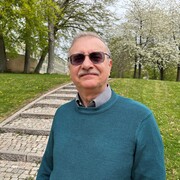
The structures of a human organism are mostly formed by proteins. Functioning of a human organism is mostly supported by proteins. Consequently, a proper amount of every protein should be maintained inside proper compartments of the cells at every time point of human life as even a slight disbalance could cause essential negative consequences. Mechanisms of protein synthesis in bacteria are known, however, despite similarity of principles, synthesis of mammalian proteins shows huge difference in the structural, functional and regulatory details that are still not known in full.
Boris Negrutskii study the proteins called translation elongation factors which are responsible for synthesis of all human proteins. An essential eukaryotic translation factor eEF1A contributes to the elongation of polypeptide chain by ribosome. It exists as two 97% homologous isoforms whose presence in mammalian cells is mutually exclusive and developmentally regulated. De novo mutations of A2 isoform cause severe neurological and heart diseases, this isoform is also markedly oncogenic. Despite significant medical and fundamental interest in the problem, the exact reason behind the different functionality of the two practically similar proteins is not known.
The project financed by the AUFF-Ukraine research fellowship is directed towards solving this puzzle at the level of primary functions of these proteins. Apart from being of independent scientific importance, this project nicely complements our job on resolving possible structural differences of the isoforms which is impossible to continue now in Ukraine because of the Russian invasion.
The Department of Molecular Biology and Genetics, Faculty of Natural Sciences, Aarhus University
Area of research:
Structural and functional proteomics
Fellowship period:
22 April 2022 - 21 April 2023
Fellowship type:
AUFF-Ukraine fellow

This fellowship has received funding from The Aarhus University Research Foundation (AUFF)
